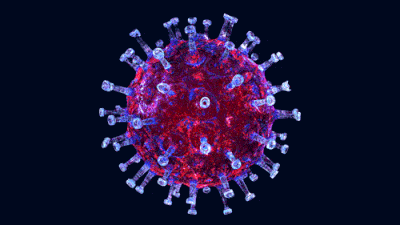



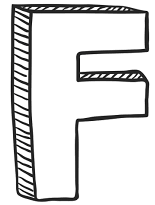 or
much of our existence—from the cave paintings of
Lascaux in France to graffiti tagging or
much of our existence—from the cave paintings of
Lascaux in France to graffiti tagging 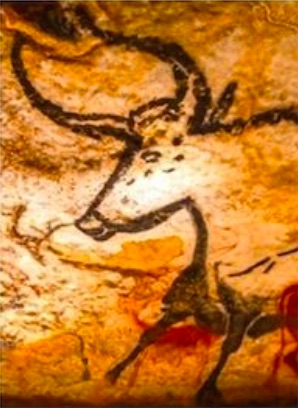 on vacant buildings
everywhere—humans have told stories through
pictures. Sequential art (the fancy name for what we
used to call comics) is its most contemporary
manifestation, offering readers/viewers (?) a visual
text, sometimes accompanied with words, meant to be
“read/seen” by the viewer. on vacant buildings
everywhere—humans have told stories through
pictures. Sequential art (the fancy name for what we
used to call comics) is its most contemporary
manifestation, offering readers/viewers (?) a visual
text, sometimes accompanied with words, meant to be
“read/seen” by the viewer. Our always evolving experimental class offers students from all majors and minors a brief study of sequential art from images in paleolithic cave paintings to medieval manuscripts, followed by a consideration of the aesthetic, formal, and stylistic features of comics across cultures. 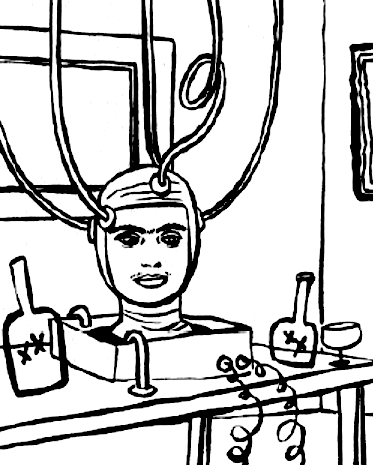 As we wrestle with
these outrageous graphic monsters, students will
develop an appreciation of, and a language for,
analyzing comics as an art form. But more than that,
we will come to experience comics for all they are,
including: 1]. the precursor and controversial
template for motion pictures back in the day; 2]. a
revolutionary art form that put the revolution into
cultural resistance back in the 1960s; and, 3]:
perhaps most interestingly, a viral medium, a growing
virus-like mirror/medium that gives us the next,
best incarnation of literature today, here in the
21st century, in the age of the smartphone (and
Covid-19). As we wrestle with
these outrageous graphic monsters, students will
develop an appreciation of, and a language for,
analyzing comics as an art form. But more than that,
we will come to experience comics for all they are,
including: 1]. the precursor and controversial
template for motion pictures back in the day; 2]. a
revolutionary art form that put the revolution into
cultural resistance back in the 1960s; and, 3]:
perhaps most interestingly, a viral medium, a growing
virus-like mirror/medium that gives us the next,
best incarnation of literature today, here in the
21st century, in the age of the smartphone (and
Covid-19).Comics, like anything else, are always evolving--ostensibly identical in terms of gender politics, consider these two selections, one, from the 1970s, penned by Dan De Carlo, the second, from 2019, by Chelsea Cain and Kate Niemczyk: Betty and Veronica, Archie Comics, circa 1970s click to enlarge  Man-Eaters #1, Chelsea Cain, Kate Niemczyk, et al, Image Comics, 2019 Click to enlarge 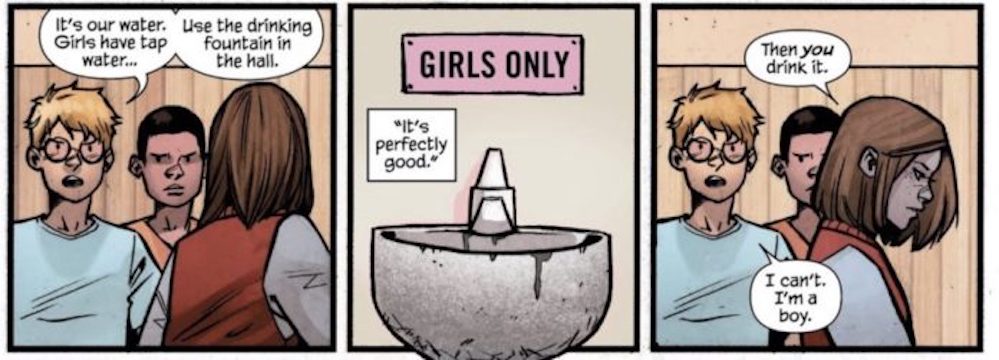 We will look to chronicle these changes throughout the semester as we consider history, literature, art, and comics, in the age of Covid-19. |
||||||||
| Student Learning Outcomes Blah. Blah. Blah.  Usually, state-mandated or CSU-authored "student learning outcomes" read like the drivel you don't read when you update the OS of your phone or laptop. We here at the Virus Eye/I think differently. Here's our promise. If you do all the readings and attend all of the classes, I promise you will be able to talk about comics, literature, art, television, and culture as well as Nerdwriter, aka Evan Puschak. Or, at the very least, pretty close to his capabilities! Watch both of these whether you are familiar with comics or not! Nerdwriter on Art Spiegelman's MAUS Nerdwriter on Neil Gaiman's THE SANDMAN |
||||||||
 If you are a student with a disability and believe you will need accommodations for this class, it is your responsibility to contact Student Ability Success Center at (619) 594-6473. To avoid any delay in the receipt of your accommodations, you should contact Student Ability Success Center as soon as possible. Please note that accommodations are not retroactive, and that I cannot provide accommodations based upon disability until I have received an accommodation letter from Student Ability Success Center. Your cooperation is appreciated. More info: https://newscenter.sdsu.edu/student_affairs/sds/Default.aspx |
||||||||
 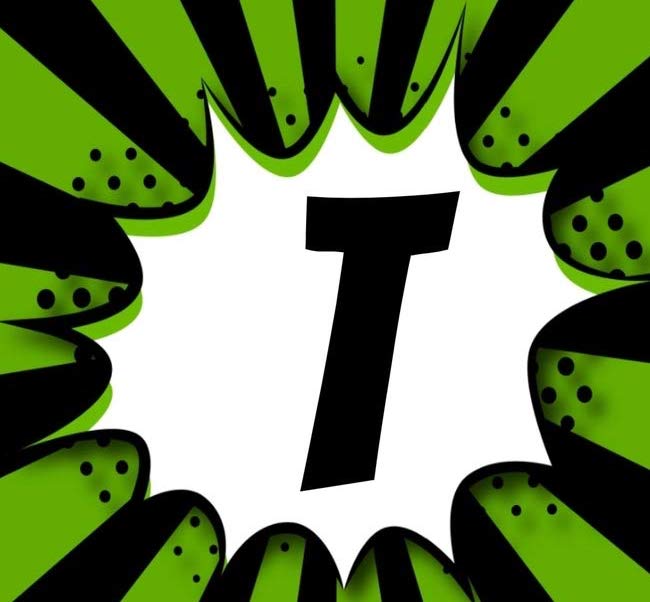 his is a university-level
course in comics, literature, film, art, and the
internet--as it is thematically focused on issues of
representation, subjectivity, psychology, and
sexuality, it should not come as a shock that students
in the class may, from time to time, encounter
characters, ideas, situations, images, language, and
scenarios that make them uneasy. his is a university-level
course in comics, literature, film, art, and the
internet--as it is thematically focused on issues of
representation, subjectivity, psychology, and
sexuality, it should not come as a shock that students
in the class may, from time to time, encounter
characters, ideas, situations, images, language, and
scenarios that make them uneasy. WELCOME TO THE UNIVERSITY! The antithesis of a place of worship, the flipside of a space dedicated to faith and belief, the university is a site of questioning--a sacred space of critical thinking, skepticism, cynicism and irony. So open your eyes, jump-start your mind, and prepare to enter the choppy corridors of the always already evolving world of comics and history. 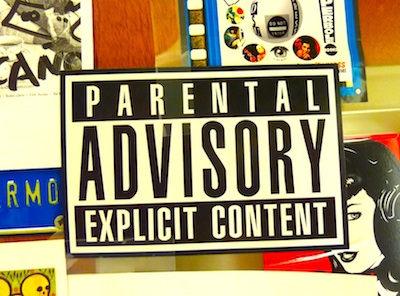 |
||||||||
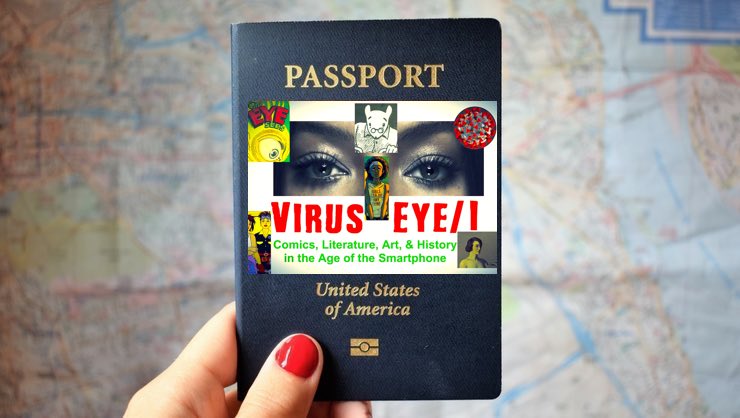 Engl
157: Comics &
History Passport A Description of How Your Work Will Be Evaluated in #viruseye2020 This section of your online syllabus documents how your work will be evaluated Fall 2020. Here you will find all the little gates, cages, locks, statutes, ordinances, edicts, and formulas that allow our innovative comics and history collective to thrive.  Let me underscore
that you have absolute intellectual freedom in
our seminar, BUT to receive
these awesome rights, you must also follow the serious
but reasonable responsibilities outlined on this part of your
syllabus. Let me underscore
that you have absolute intellectual freedom in
our seminar, BUT to receive
these awesome rights, you must also follow the serious
but reasonable responsibilities outlined on this part of your
syllabus. After all, we want to have a great time, to be the best literature/cultural studies class on the West Coast, even! Take that USC! Eat my dust UCLA! And it will be easier to achieve this semester as they, like us, are online all the time! But to do that, we need room for intellectual play--a safe asylum within which to forge our comics-laced, history-filled wanderlust. So, then, read these laws carefully and thoroughly, so when you sign on for our first class on August 25, 2020, you will know what you are in for! OFFICE HOURS
{Ok,
so that paragraph previous was obviously written
pre-COVID... and while I would like to meet each and
every one of you, it just won't happen this Fall
2020 where Zoom will be the name of the game. Check
back here after the semester begins and I will have
sorted out how we
are going to do office hours (maybe via zoom, maybe
via a Canvas chatroom, or a Google hangout--we will
figure it out). At SDSU, it's
easy to fall through the cracks, to feel that you are
nothing but a Red ID# or some warm pile of sentient
flesh filling a seat. In order to convince you that the Professor
teaching you is occasionally human, please make
a point during the semester to take the time to
introduce yourself whether it be by piping up in
class, zapping me an email, or posting on one of our
social media channels. Regardless of how we end up arranging things, if you find my posted office hours are inconvenient, do not hesitate to email me for a phone or zoom appointment either at memo@sdsu.edu or bnericci@mail.sdsu.edu You can also call me at 619.594.1524 via telephone, but keep in mind I don't check my medieval office landline very often!PASSPORT RULE 1 BOOKS_BOOKS_BOOKS BUY THE BOOKS AND READ
THEM--DON'T COME TO SEMINAR WITHOUT YOUR BOOK! Though we very much adore
living in the 21st century, we will, for the most
part use ANALOG, printed books in this class. So check out each one
and buy them now! PASSPORT RULE 2 READ_READ_READ! When you enter
this room for class you will have completed the reading that appears
on the day-to-day class calendar, aka the
Daily Lineup! Please note the word
"finished" (not "started," not "skimmed," not
"glanced," and most decidedly NOT "I read the
Cliffs/Sparks Notes and a review of the damned thing
online!"). Do
the readings. Do them twice if
you can MAKE the time! I know, you are saying to
yourself, "they don't make me read in my other
classes" or some other sort of nonsense... well here,
you must! Think twice about joining us online if you
have not finished the readings--the quality of our
class depends upon your dedicated work and your
relentless and independent curiosity. Without your
periodic intellectual donations, the class is likely
to evolve into a boring, even painful waste of
time.
Your laptop will
be asleep IN YOUR BAGS during class--or, better
yet, resting in your dorm room or apartment. Have you noticed
how anytime a student uses a laptop in an auditorium
there is a "cone
of distraction" alongside and behind the student using a
computer? This is usually
due to said student surfing the web via wi-fi perusing
erotic delights or god knows what. I was
recently at a cool (ok, it was slightly boring, I
confess) lecture by a noted writer--as I tried to
listen to her, in front of me, a diverted student
(attending the lecture, no doubt, for extra-credit)
was perusing sites like these
(nsfw or school). So, laptops are GREAT for
entering your notes AFTER class, but they will not
be allowed in our lecture hall. If you have an issue with this, schedule a
meeting with me during office hours to chat the
first week of class. THE SMARTPHONE!
PASSPORT RULE 5 Charlie-Delta_Thief
In the university, plagiarism refers to the art and crime of presenting other people's work under your own signature, aka cutting and pasting copied crap from Wikipedia--definitely a BAD thing. While your professor is forbidden by CSU/SDSU code from tattooing the word LOSER on the foreheads of guilty students, he can promise that felonious students will be remanded to the state-authorized SDSU executioners. Read THIS as well--SDSU is SERIOUS about this shit, so don't take any chances! Rely on your own singular mind and imagination! Major Course Requirements
QUIZZES & ATTENDANCE
Missing class, you miss, as well, the whole point of the adventure. That DOES NOT MEAN that we will
meet as a ZOOM class for every class session--but it does
mean that when we do, you are expected to be there
attending virtually. What does that mean? It
means DON'T SCHEDULE WORK FOR DURING CLASS TIME as you
will be SOL, "soooooooo out of luck." So please bypass no more than three
classes during the semester--you are responsible for
any work/notes you miss when you are absent and can PRESUME
that what you missed that day was important! If you miss MORE than
three classes during the term and your grade will
decay in an ugly way. EXAMPLES: your hard-earned A-
will morph into a B-; your "gentleman's C" will
appear on the webportal as a "D," etc. etc. Ditching
this class too often will be as fun as a case of
flesh-eating virus. While attendance was not really
an issue last semester during the beginnings of the
COVID crisis, it will be this fall as we all go into
this semester with eyes open. During the semester,
you can expect several In-class Panic-Inducing
Challenges otherwise known as CHECK-YOU-DID-THE-READING
QUIZZES. You
can expect these miserable quizzes from time to
time, the number of quizzes depending on how many
of you are nostalgic for high school. In other
words, if everyone acts like a talented university
student, we will enjoy FEW if any quizzes during
our semester. DIGITAL/VIRTUAL CONTRIBUTIONS (Voluntary NOT Mandatory)
You can also contribute to your
own instagram hashtag#, which
goes by the catchy, if difficult to type, #viruseye2020.
If Facebook, Tumblr, and Instagram remain alien to
your consciousness, you can send your suggested
links/images/videos to me via email to
bnericci@sdsu.edu; I don’t promise that I will post
ALL of your materials but I will try, however, to see
that some of them make their way to the fabulous
internets. What are you expected to share via
social media? Things you run across that relate
to our class readings and discussions--you do not HAVE
TO WRITE a long essay with your postings... a couple
of pointed, pithy, well-crafted sentences will do,
enough to give me and your classmates a sense of a
connection to ideas developed during the semester in
our class. There will be both a Mid-Term VirusEYE Challenge, a Mid-Semester test administered on Thursday, October 29, 2020 at 11am via Zoom or a service to be determined ...
...a Final VirusEYE Challenge (aka, the FINAL EXAM) on the last regularly scheduled day of class: Thursday, December 10, 2020 at 11am--warm thanks to Shiraz Nicpon, your colleague whose nifty eye corrected my dates posted previously here in error. Your final is absolutely comprehensive; it assumes you have read all the books and screened all the movies that are part of our required work. If you do the work, the final is a breeze--even "fun" if you can believe it. If you slack off, you will find the final In-Class Imagination Challenge as enjoyable as being the waiter for the Here Comes Honey Boo-Boo clan! |
||||||||
 Virus Eye/I Graduate
Teaching Assistants and Section Leaders! Virus Eye/I Graduate
Teaching Assistants and Section Leaders! |
||||||||
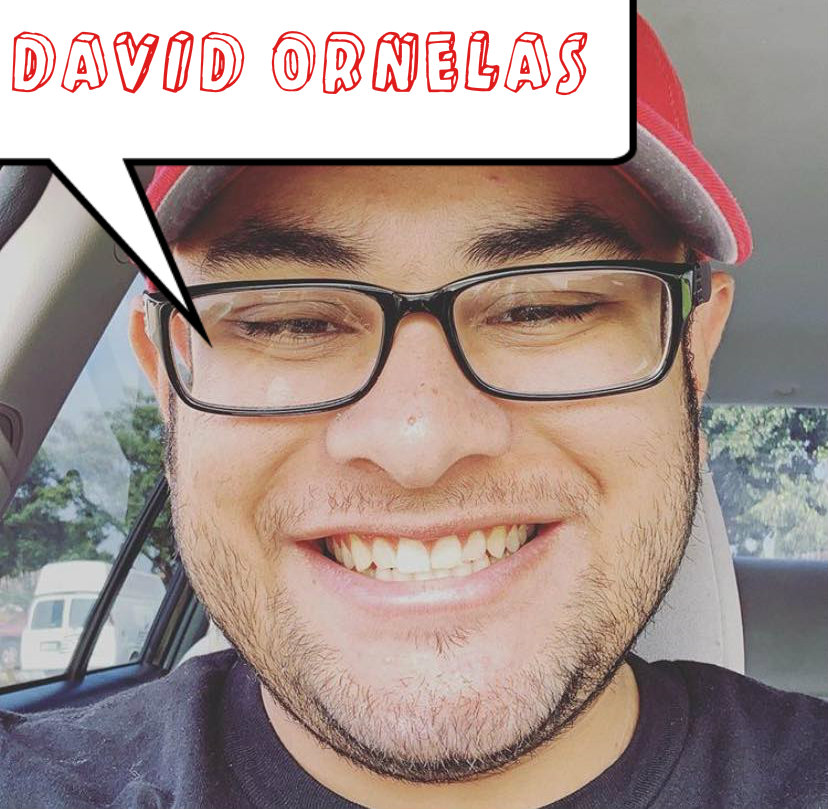 THE
DIS-EASED ILLUSTRATORS THE
DIS-EASED ILLUSTRATORSDavid Ornelas email: dornelas AT sdsu DOT edu (ABDI to GRIFFIN) Hello, I'm David Ornelas. This will be my second year here at SDSU in the MALAS Program. I received my B.A. from SDSU in Rhetoric Writing Studies. The most intriguing thing about comics and history, is the deeper meaning beyond what's in front of your face. This class will open your eyes to so much more than just pictures in a book . Dr. Nericcio is a great Professor and I know you'll all enjoy this course! {note from Bill: "I did not pay him to say that."} |
||||||||
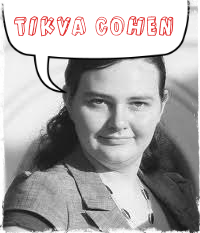 THE
SEMIOTIC GERMS THE
SEMIOTIC GERMSTikva Cohen email: tacohen AT sdsu DOT edu (GUAPO to MORRIS) Hello everyone! I am Tikva Cohen, bibliophile and tea addict. I am a second-year Master's student getting my degree in Literature. I originally attended UCSD for undergrad and got a degree in Biological Anthropology. I read books in every genre but I really enjoy science fiction, fantasy, historical fiction, and Victorian literature. I have read a few comics, but my favorite are probably Calvin and Hobbes, Sandman, and Monstress. I look forward to learning with you in this class! |
||||||||
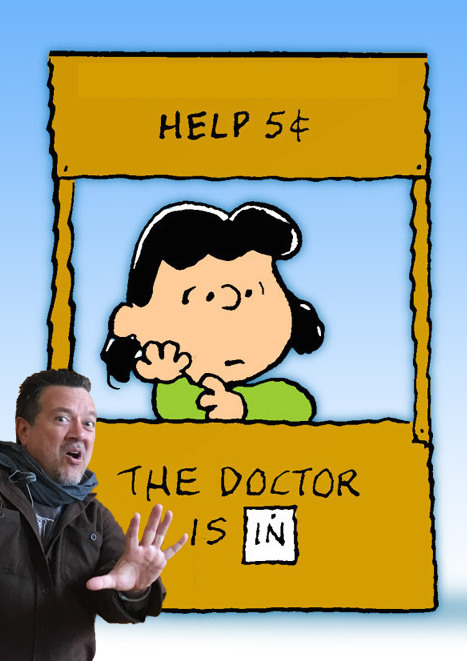 THE INFECTED
EXISTENTIALISTS THE INFECTED
EXISTENTIALISTS Dr. William (Bill or Memo) Nericcio email: bnericci AT sdsu DOT edu (MYINT-SANN to YU) William "Memo" Nericcio, a Cultural Studies Professor at SDSU since 1991, began his career as a Latin Americanist focused 20th century marvels by Carlos Fuentes, Rosario Castellanos, and Gabriel García Márquez to name a few. From his first Assistant Professorship at the University of Connecticut he moved to SDSU in 1991, his work has expanded into critical studies of film, mass culture, television, and cutting-edge Latinx fiction. With a BA in English from the University of Texas at Austin, and an MA/Ph.D. in Comparative Literature from Cornell University, Nericcio presently directs the MALAS Cultural Studies MA @SDSU and also runs SDSU Press, the oldest independent press in the CSU system (and its new comic book imprint, Amatl Comix). His ALA Choice Award-winning book in film studies, Tex[t]-Mex: Seductive Hallucinations of the “Mexican” in America appeared in 2007. His latest book, co-authored with Fede Aldama, Talking #browntv: Latinas and Latinos on the Screen, appeared December 2019 from the Ohio State University Press. |
||||||||
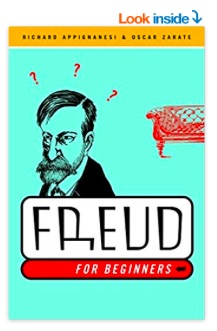 |
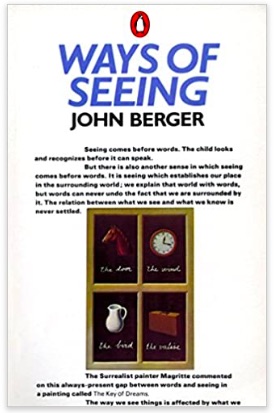 |
 |
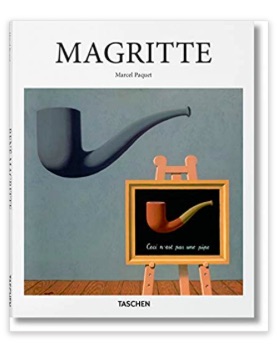 |
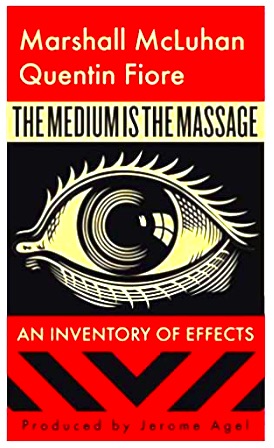 |
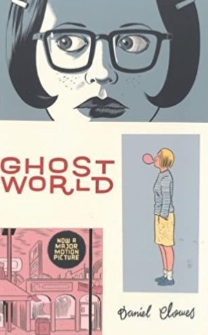 |
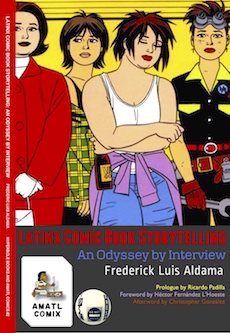 |
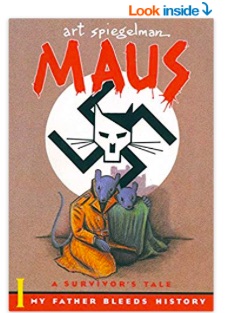 |
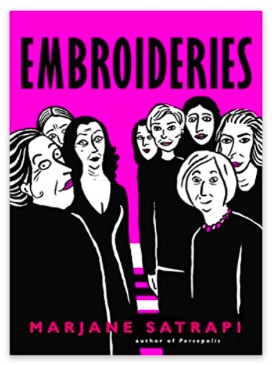 |
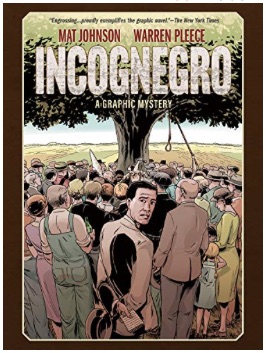 |
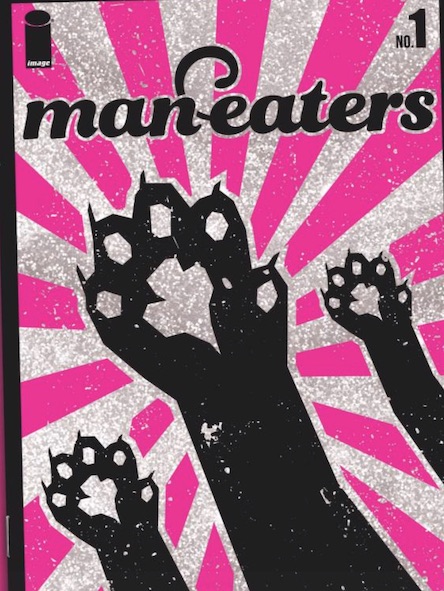 |
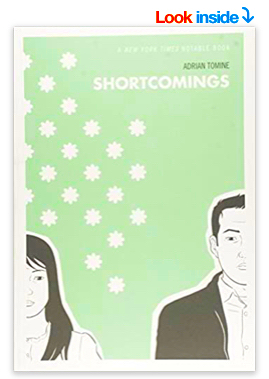 |
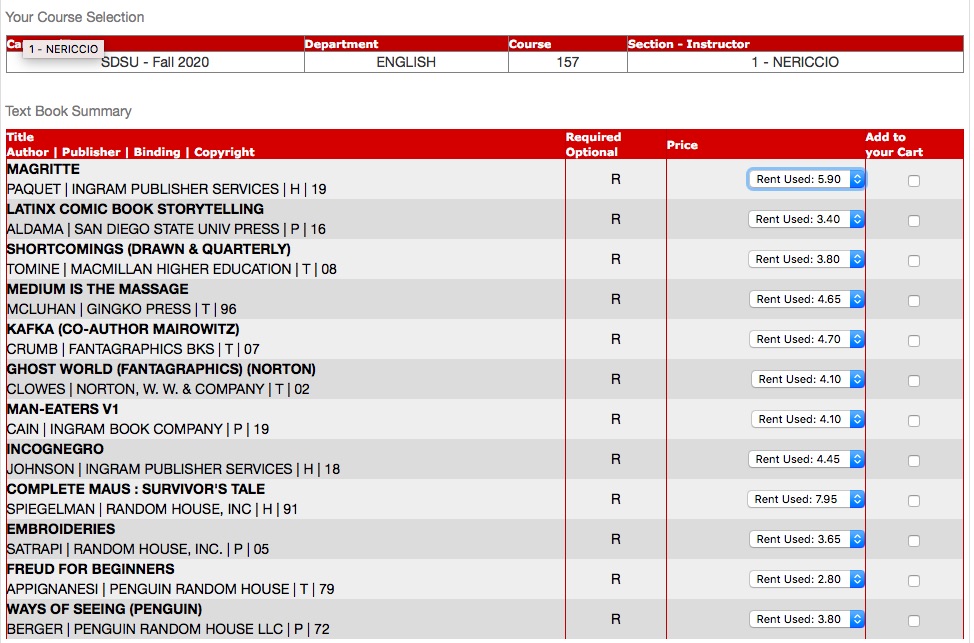
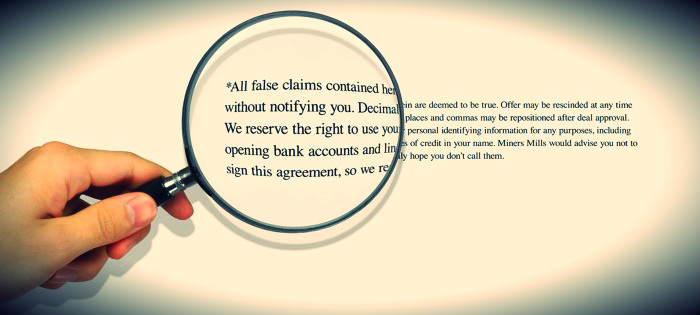 The
Fine Print |
SDSU POLICIES The
Fine Print |
SDSU POLICIESAccommodations: If you are a student with a disability and are in need of accommodations for this class, please contact Student Ability Success Center at (619) 594-6473 as soon as possible. Please know accommodations are not retroactive, and I cannot provide accommodations based upon disability until I have received an accommodation letter from Student Ability Success Center. Student Privacy and Intellectual Property: The Family Educational Rights and Privacy Act (FERPA) mandates the protection of student information, including contact information, grades, and graded assignments. I will use [TinyLetter.com] to communicate with you, and I will not post grades or leave graded assignments in public places. Students will be notified at the time of an assignment if copies of student work will be retained beyond the end of the semester or used as examples for future students or the wider public. Students maintain intellectual property rights to work products they create as part of this course unless they are formally notified otherwise. Religious
observances: According
to the University Policy File, students should
notify the instructors of affected courses of
planned absences for religious observances by the
end of the second week of classes Student email addresses: Students
are provided with an SDSU Gmail account for their
official use. This SDSU
email address
will be used for all communications. Per
university policy, students are responsible
for checking their official university email
once per day, please see Student
Official Email Address Use Policy here. Academic
Honesty: The
University adheres to a strict policy
prohibiting cheating and plagiarism. Examples of academic
dishonesty include but are not limited to: ●
copying, in part or in whole, from
another's test or other examination; ●
obtaining copies of a test, an
examination, or other course material ●
collaborating with another or
others in work to be presented without the
permission of the instructor; ●
falsifying records, laboratory
work, or other course data; ●
submitting work previously
presented in another course, if contrary to the
rules of the course; ●
altering or interfering with
grading procedures; ●
assisting another student in any of
the above; ●
using sources verbatim or
paraphrasing without giving proper attribution
(this can include phrases, sentences, paragraphs
and/or pages of work); ●
copying and pasting work from an
online or offline source directly and calling it
your own; ●
using information you find from an
online or offline source without giving the author
credit; ●
replacing words or phrases from
another source and inserting your own words or
phrases. The California State University
system requires instructors to report all
instances of academic misconduct to the Center for
Student Rights and Responsibilities. Academic
dishonesty will result in disciplinary review by
the University and may lead to probation,
suspension, or expulsion. Instructors
may also, at their discretion, penalize student
grades on any assignment or assessment discovered
to have been produced in an academically dishonest
manner. Resources
for students: A
complete list of all academic support
services--including the Writing
Center and Math Learning
Center--is available on the Student
Affairs’ Academic
Success website. Counseling
and Psychological Services
(619-594-5220) offers confidential counseling
services by licensed therapists; you can Live Chat
with a counselor at http://go.sdsu.edu/student_affairs/cps/therapist-consultation.aspx between 4:00pm and 10:00pm, or
call San Diego Access and Crisis 24-hour Hotline
at (888) 724-7240. Sexual
violence / TItle IX
mandated reporting: As an
instructor, one of my responsibilities is to help
create a safe learning environment on our campus.
I am a mandated reporter in my role as an SDSU
employee. It is my goal that you feel able to
share information related to your life experiences
in classroom discussions, in your written work,
and in our one-on-one meetings. I will seek to
keep the information you share private to the
greatest extent possible. However, I am required
to share information regarding sexual violence on
SDSU’s campus with the Title IX coordinator,
Jessica Rentto
619-594-6017. She (or her designee) will contact
you to let you know about accommodations and
support services at SDSU and possibilities for
holding accountable the person who harmed you.
Know that you will not be forced to share
information you do not wish to disclose and your
level of involvement will be your choice. If you
do not want the Title IX Officer notified, instead
of disclosing this information to your instructor,
you can speak confidentially with the following
people on campus and in the community. They can
connect you with support services and discuss
options for pursuing a University or criminal
investigation. Sexual Violence Victim Advocate
619-594-0210 or Counseling and Psychological
Services 619-594-5220, psycserv@sdsu.edu. For more information regarding
your university rights and options as a survivor
of sexual misconduct or sexual violence, please
visit titleix.sdsu.edu or sdsutalks.sdsu.edu. Classroom Conduct Standards: SDSU
students are expected to abide by the terms of the
Student Conduct Code in classrooms and other
instructional settings. Prohibited
conduct includes: ●
Willful, material and
substantial disruption or obstruction of a
University-related activity, or any on-campus
activity. ●
Participating in an
activity that substantially and materially
disrupts the normal operations of the University
or infringes on the rights of members of the
University community. ●
Unauthorized recording,
dissemination, or publication (including on
websites or social media) of lectures or other
course materials. ●
Conduct that threatens or
endangers the health or safety of any person
within or related to the University community,
including 1. physical abuse, threats,
intimidation, or harassment. 2.
sexual misconduct. Violation of these standards will
result in referral to appropriate campus
authorities. Medical-related
absences: Students are instructed to contact
their professor/instructor/coach in the event they
need to miss class, etc. due to an illness, injury
or emergency. All
decisions about the impact of an absence, as well
as any arrangements for making up work, rest with
the instructors. Student Health
Services (SHS) does not provide medical
excuses for short-term absences due to illness or
injury. When a medical-related absence persists
beyond five days, SHS will work with students to
provide appropriate documentation. When a student
is hospitalized or has a serious, ongoing illness
or injury, SHS will, at the student's request and
with the student’s consent, communicate with the
student's instructors via the Vice President for
Student Affairs and may communicate with the
student's Assistant Dean and/or the Student Ability
Success Center. SDSU
Economic Crisis Response Team: If
you or a friend are experiencing food or housing
insecurity, technology concerns, or any unforeseen
financial crisis, it is easy to get help!
Visit sdsu.edu/ecrt for
more information or to submit a request for
assistance. SDSU's Economic Crisis Response
Team (ECRT) aims to bridge the gap in resources
for students experiencing immediate food, housing,
or unforeseen financial crises that impacts
student success. Using a holistic approach to
well-being, ECRT supports students through crisis
by leveraging a campus-wide collaboration that
utilizes on and off-campus partnerships and
provides direct referrals based on each student’s
unique circumstances. ECRT empowers students to
identify and access long term, sustainable
solutions in an effort to successfully graduate
from SDSU. Within 24 to 72 hours of submitting a
referral, students are contacted by the ECRT
Coordinator and are quickly connected to the
appropriate resources and services. For students
who need assistance accessing technology for their
classes, visit our ECRT website (sdsu.edu/ecrt) to be connected with the SDSU
library's technology checkout program. The
technology checkout program is available to both
SDSU and Imperial Valley students. |